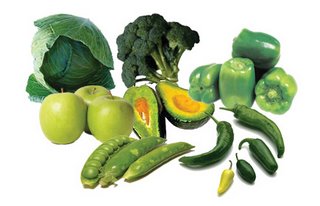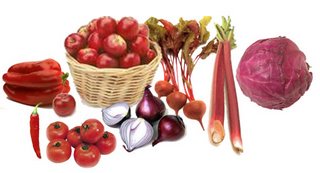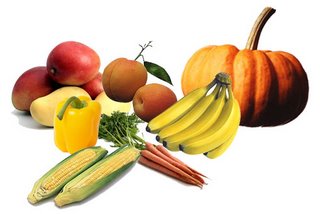●Ginger ●Apples ●Apricots ●Bananas ●Cranberries ●Garlic ●Globe artichokes ●Oats ●Olive oil ●Yogurt
Some of the foods I have already mentioned, but this time it’s in more detail and how they work. Always try to buy fresh organics whenever possible, as they have a higher concentration of natural goodness and are much less likely to be contaminated with any chemicals.
 Ginger
GingerWhat it’s good for
●Chilblains
● Tiredness and exhaustion
● Colds, a temperature and flu. Drink it with some honey and lemon
● Dull, dry skin
● Helps poor blood circulation
How it works
This spice contain s powerful essential oils which warm the body and are antibacterial. For the problems listed here, make a ginger drink - by simmering five or six thin slices of the fresh root in water for about ten minutes or eat a piece of it, either fresh or cooked, every morning.
 Apples
ApplesWhat are they good for
●Aching joints and rheumatism. Chop three apples into pieces without removing the skin. Boil for 15 minutes in half a pint of water and drink when cool.
●High cholesterol.
●Diarrhoea and stomach aches. Eat a couple of spoonfuls of baked apple every hour or so.
How they work
This fruit contains very high levels of pectin - a soluble carbohydrate which reduces cholesterol level in the blood by soaking it up and preventing it from being absorbed into the body. Pectin and tannin also help destroy uric acid, one of the body’s waste products. Apples are an antiseptic, too and help fight against infections in the intestines.
 Apricots
ApricotsWhat are they good for
●Very dry skin.
●Acne. Eat dried and fresh apricots - though fresh contain more vitamin C.
●They help to heal both cuts and wounds.
●Varicose veins.
●Depression.
●Anaemia and tiredness.
●Constipation. Eat 3- dried halves every morning.
How they work
Beta-carotene is found in this fruit. It fights against ageing and pollution and helps the body heal itself. The beta-carotene and iron content are even more concentrated in the dried variety, and both help the blood supply. Apricots also contain vitamin B and potassium, which strengthen the nervous system.
 Bananas
BananasWhat they are good for
●Strengthening bones, osteoporosis.
●PMT, depression, seasonal Affective Disorder (SAD)
●Irritability and stress.
●Diarrhoea. Eat half a mashed banana every hour.
How they work
These are particularly good for children and older people because they’re so easily digested. As well as other nutrients, they contain calcium, iron and potassium which strengthen the body and fight against stress. They are also a good source of vitamin B6 and a form of fibre which helps the body eliminate toxins from the system. Eat them ripe as they can be hard to diest when still green.
 Cranberries
CranberriesWhat it’s good for
●Cystitis and urine infections.
Drink one litre of juice through the day during an attack, then a glass every morning to minimise any recurrence of the problem. Can be used over long periods with no side effects.
●Kidney stones.
●Tonsillitis, laryngitis and sore throats.
●Acne and skin blemishes.
●Soothing sensitive and / or bleeding gums.
How they work
As well as being rich in vitamin C which helps to prevent colds - cranberries are anti-septic and kill infections as they pass through the body. They’re also rich source of potassium, iron and vitamin A. You can make your own juice or puree by simply simmering he fresh berries in water for about an hour, then adding sugar or honey to taste.
 Garlic
GarlicWhat they are good for
• Coughs, colds and flu
• Asthma and hay fever
• High blood pressure
• Poor circulation
• Cellulite and fluid retention
• Treating cystitis and bladder infections
Now it works
Contains sulphur compounds and iodine, which disinfect the blood and thin it so that it flows more freely. It is also useful as an expectorant, as it loosens mucus in the body. Eaten regularly, garlic helps strengthen the body's natural defence, the immune system. Cooking destroys some of the minerals so eat one or two chopped or crushed raw cloves a day in salads or with vegetables. Chew parsley or coffee beans to get rid of the odour afterwards.
 Globe artichokes
Globe artichokesWhat they are good for
• Liver problems. Try to eat one or two every day
• Fluid retention and cellulite
• Chronic tiredness
How they work
This vegetable contains a chemical called cynarine which helps the liver to function by simulating bile secretion. Artichokes are also an effective diuretic‑ they increase the flow of urine‑so they are extremely helpful with problems of fluid retention. Artichokes are most easily digested if boiled and eaten with a little olive oil.
 Oats
OatsWhat they are good for
• High cholesterol
• Strengthening your bones and teeth
• Diabetes and high blood sugar levels
• Constipation
• Stress
• Depression
How they work
Containing fibre, B vitamins and minerals, oats also soak up the cholesterol in the blood so that it's passed through the body without being absorbed. High in calcium, potassium and magnesium which, like the B vitamins, are good for the nervous system. The silicon content helps to maintain healthy arterial walls. Swap your sugary cereal for a bowl of porridge every morning.
 Olive oil
Olive oilWhat ifs good for
•Treating constipation and haemorrhoids, especially during pregnancy
• Sensitive, dull and dry skin
• Aching joints and arthritis
• Digestion
• Stomach upsets, liver complaints and ulcers
• High blood pressure and high cholesterol
• Varicose and broken veins
How they work
This monounsaturated oil lubricates the whole body from the inside, helping the body pass food through the system more quickly and easily. It is also rich in vitamin E, which has powerful antioxidant properties, and vitamin A. Replace other oils with extra virgin olive oil when cooking.
 Yogurt
YogurtWhat it's good for
• Candida and thrush‑for both of these you should eat at least four small cartons of natural live yogurt a day
• Acne and problem skin
• Stress and irritability
HOW it works
A bacterium called lactobacillus, which is present in yogurt helps balance the bacteria which naturally occur in the stomach. Lactobacillus also fights fungal infections such as thrush. Yogurt is a rich source of important minerals, particularly potassium, which has a role in feeding the nervous system.






